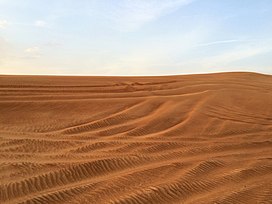| Arabian Desert ٱلصَّحْرَاء ٱلْعَرَبِيَّة | |
|---|---|
 Desert near Sharjah, United Arab Emirates | |
 Map of the Arabian Desert ecoregion | |
| Ecology | |
| Realm | Palearctic |
| Biome | deserts and xeric shrublands |
| Borders | |
| Geography | |
| Area | 1,855,470[1] km2 (716,400 sq mi) |
| Countries | List
|
| Conservation | |
| Conservation status | critical/endangered[2] |
| Protected | 4.368%[1] |
The Arabian Desert (Arabic: ٱلصَّحْرَاء ٱلْعَرَبِيَّة) is a vast desert wilderness in West Asia that occupies almost the entire Arabian Peninsula with an area of 2,330,000 square kilometers (900,000 sq mi).[3] It stretches from Yemen to the Persian Gulf and Oman to Jordan and Iraq. It is the fourth largest desert in the world and the largest in Asia. At its center is Ar-Rub' al-Khali (The Empty Quarter), one of the largest continuous bodies of sand in the world. It is an extension of the Sahara Desert.[4]
Gazelles, oryx, sand cats, and spiny-tailed lizards are just some of the desert-adapted species that survive in this extreme environment, which features everything from red dunes to deadly quicksand. The climate is mostly dry (the major part receives around 100 mm (3.9 in) of rain per year, but some very rare places receive as little as 50 mm), and temperatures oscillate between very high heat and seasonal night time freezes. It is part of the deserts and xeric shrublands biome and lie in biogeographical realms of the Palearctic (northern part) and Afrotropical (southern part).
The Arabian Desert ecoregion has little biodiversity, although a few endemic plants grow here. Many species, such as the striped hyena, jackal and honey badger, have died out as a result of hunting, habitat destruction, overgrazing by livestock, off-road driving, and human encroachment on their habitat. Other species, such as the Arabian sand gazelle, have been successfully re-introduced and are protected at reserves.
- ^ a b "Arabian Desert and East Sahero-Arabian xeric shrublands". Digital Observatory of Protected Areas. Accessed 19 December 2022. [1]
- ^ "Arabian Desert". Terrestrial Ecoregions. World Wildlife Fund.
- ^ "Arabian Desert | Facts, Definition, Temperature, Plants, Animals, & Map | Britannica". www.britannica.com. Retrieved 2022-10-22.
- ^ "Arabian Desert: Middle East". geography.name. Retrieved 2022-10-22.